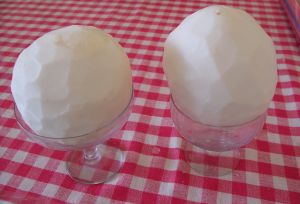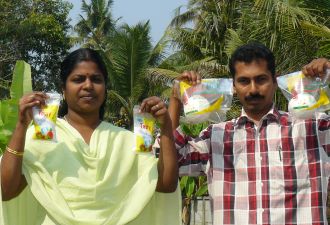Tender coconut is a natural health drink that has considerable nutrients. The white meat of fairly grown up tender coconut is a mini meal in itself. A glass of coconut lassi, a drink made by churning out the tender coconut juice and the white meat would easily keep the hunger away for 4 - 5 hours.
Thailand, a small country with only 6.73 per cent of world's coconut production is in the forefront of tender coconut value addition today. It is providing livelihood for thousands of families. Though we in India produce 27.08 per cent of world's coconuts, except for selling tender coconut as it is, we haven't achieved value additions worth the name and scale.

![]() Snow Ball Tender Coconut or STBC, ready to eat. Customers drink the inner juice first by piercing a straw. Later, with the help of a fork and knife, the ball is made into small pieces to eat. Pic: Shree Padre.
Snow Ball Tender Coconut or STBC, ready to eat. Customers drink the inner juice first by piercing a straw. Later, with the help of a fork and knife, the ball is made into small pieces to eat. Pic: Shree Padre.
Snow Ball Tender Coconut - SBTC -- is a promising value addition of tender coconut. It is nothing but the soft white ball obtained after neatly removing the outer shell. Central Plantation Crops Research Institute (CPCRI) based at Kasaragod Kerala has developed a machine to help produce SBTC. A food cum drink, this product has good potential to attract tourists and visitors who have not experienced the taste of tender coconut.
How to eat, nay, drink snowball tender coconut? It is served in a cup or wrapped in a tissue paper. Customers drink the inner juice first by piercing a straw. Later, with the help of a fork and knife, the ball is made into small pieces to eat.
Biju Balakrishnan's (31) one year old small enterprise, Kairali Snowball Tender Coconut at Kochi is perhaps the only serious attempt to market SBTC so far. Operating from his house, Biju has been supplying SBTC to a regular clientele he has built up including some city hospitals.
The SBTC cutting machine he has bought from Mangalore on CPCRI's recommendation has cost Biju Rs.19,000. It has a half HP electricity motor and a circular blade. By carefully handling this machine, skilled workers can the coconut shell without damaging the inner meat portion.
Biju Balakrishnan and wife Deepa are graduates. Initially, to get twenty finished products, he had to use fifty raw tender coconuts. Now, he dehusks the nut and cuts the shell with the machine's help. Wife Deepa does the rest. Peeling the ball out and removing the testa (brown outer layer) is her responsibility. "If you are experienced, starting from dehusking to snowball, it takes only five minutes."
Practical issues
Soon Biju realised that there are many hurdles in his path. The first one was non-availability is the right kind of tender coconut. To make SBTC, seven month old tender coconut is just right. If it's still tender, the ball can't be removed intact. Even if this is achieved, it won't stand transportation. Grown up ones won't be tasty, the inner juice would be sourish.
The CRPCRI literature claims that snowball tender coconuts 'can be used till 10-15 days if kept inside fridge.' "But in reality, its taste changes", points out Biju, "for the very next day." Even with utmost care, certain amount of breakage of balls can't be avoided.

![]() Biju's tender coconut products. Pic: Shree Padre.
Biju's tender coconut products. Pic: Shree Padre.
To use the broken balls productively, Biju started a product - Tender coconut lassi - what he calls as Elaneer juice. Blended with a dash of cardamom, this was instantly accepted by his customers. He sells 200 ml hand-sealed packet of this drink for Rs.10. As production of SBTC turned irregular, he made Elaneer Juice his main product.
Whenever right type of raw tender coconuts is available, he makes SBTC. Neatly packed in plastic bags, it is sold to the canteens of three leading hospitals for Rs.17. The canteens sell it for Rs.25. "There are a few doctors who are regular customers of my snowball, but I'm sorry that I can't keep up the supply regularly. As getting raw material is uncertain, I'm not in a position to accept advance orders. In fact, if regular supply can be maintained, good market can be developed for SBTC."
After packing, Biju keeps the Elaneer juice in his freezer. Hours later it's transferred into thermocol cooler box for transportation. After reaching the hospital canteens, the packets are transferred to their fridge. "If kept in fridge, it remains for three days", he points out, "in fact, this product is better accepted than SBTC."
Coconut lassi
Everyday, this couple produces 50 to 100 Elaneer juice packets. As it is a home product, they haven't put a brand name to it. "Neither can I afford media advertisements. Yet once in a while, we get orders for functions and marriages", says Deepa proudly.
One such memorable occasion was when they were asked to serve this natural drink for the two day All India Physicians meet held at Kochi last year. Each day, they had to supply 750 packets. "It was a great occasion", Biju recalls, "Good number of doctors drank two packets." Marriage order means a market for 500 drinks at one stretch.
Ernakulam Lake show hospital, Ernakulam Medical Centre and Wellcare Hosiptal are the three big customers for Elaneer juice. Doctors, nurses and members of patients' households who stay with them are its regular buyers. "The main virtue of our products", according to Balakrishnan, "is that it's natural; I think that's why the customers like it." One north Indian doctor was so impressed that he took a few snowball tender coconuts in a cool box in the plane to share with his family members.
Another big break was two small stints he got to sell his products in city's water park Veegaland. He could sell 150 juices each day on average. Whenever raw material was there, 50-60 snowballs as well. "It is the north Indians who like the snowball more. Cardamom flavor of the juice as a special attraction for most of them", says he.
Kerala's agriculture department has given an incentive of Rs.20,000 to Biju to start this home industry. The biggest challenge to this business is rain. Kerala has 4-5 months of rain. As such to cling on to this profession in monsoon is not possible. "Practically, this is only half years business. I'm able to save something only because it's a low investment enterprise. I'm raking up my brain to explore the possibilities of earning money from the same raw material in monsoon too. "

![]() Deepa and Biju Balakrishnan. Pic: Shree Padre.
Deepa and Biju Balakrishnan. Pic: Shree Padre.
Tender coconut ice-cream is a product Balakrishna has set his mind to. But, again, it can't be produced and sold in rainy season. "Carbonated tender coconut water is a possibility. This technology is there in the state. But major problem is that it requires huge investment", he explains. Biju hopes that if good quality bottled tender coconut can be produced, there may be a market worth exploring in bars which will be less impacted during rainy days. Summer rains and unexpected rainy days - like this year's - too cause him considerable loss.
This couple had very high hopes on marketing SBTC. "Even now as and when I get right raw material, we keep doing it. Say about 750 in a month in the season." If only a regular supply network can be built up to send snowball to the nearby famous boat house centres of Aleppey and tourist centres like Kumarakam and Munnar, this product would click among the northern and offshore tourists.
Though the returns aren't very attractive, the couple have not given up hope. "However, this income is not suffice us to make a living. As such, I deal a little bit with real estate and share business to make both ends meet", says Biju.
The Food and Agriculture Organization (FAO) of US has reportedly developed a technology by which tender coconut juice can be preserved and sold for three weeks in a specially built mobile can. Such technologies would help such home scale industries.
























